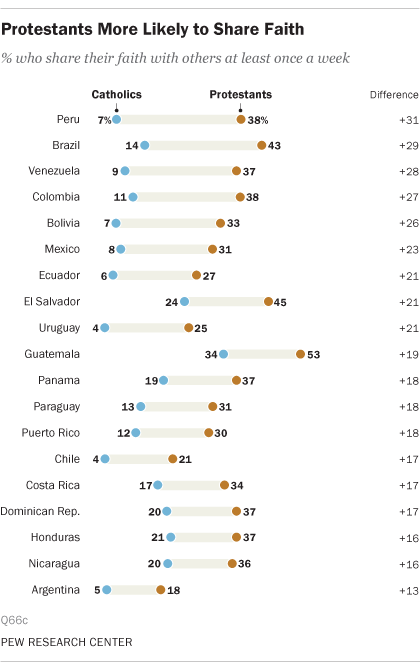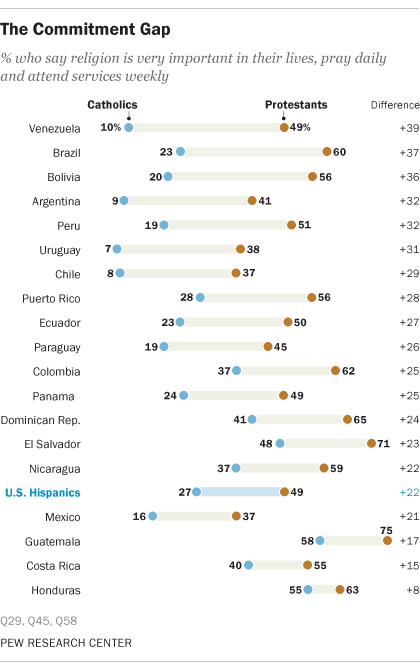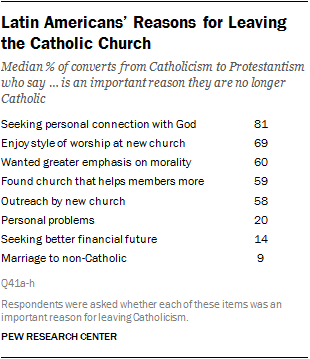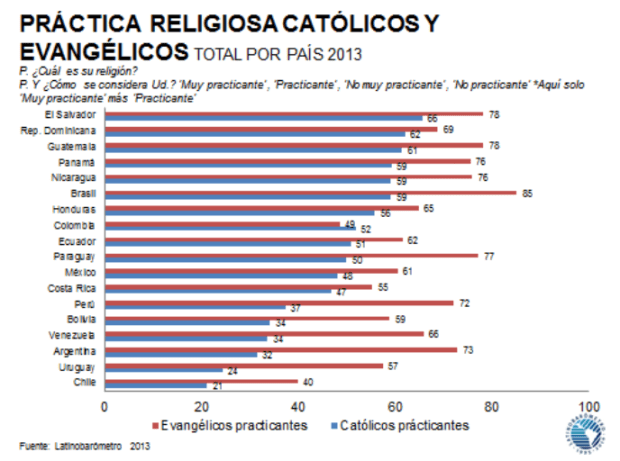The latest data not only show that Protestants are remarkably ascendent throughout the longtime Catholic stronghold of Latin America. The Pew Research Center also offers a window into who evangelizes most, which millennials pray and attend church most often, and just how charismatic Pentecostals actually are, among other findings.
Based on 30,000 face-to-face interviews in 18 nations (plus one US territory, Puerto Rico), here are some highlights of what the region's Protestants believe and practice:
- In most countries, roughly 1 in 3 Protestants "share their faith with others" weekly. Most likely to evangelize [per chart below]: Guatemalans (53 percent), Salvadorans (45 percent), and Brazilians (43 percent). Least likely to evangelize: Argentines (18 percent), Chileans (21 percent), and Uruguayans (25 percent). “Evangelization efforts by Protestant churches seem to be having an impact," Pew notes. "Across Latin America, more than half of those who have switched from the Catholic Church to Protestantism say their new church reached out to them."

- While approximately 2 in 3 Protestants regionwide identify as Pentecostals or attend a Pentecostal church, only 20 percent to 50 percent of Protestants in a given country report high levels of experiencing “gifts of the Holy Spirit.” Most likely to experience or witness divine healing, exorcism, speaking in tongues, receiving a revelation, and/or giving or interpreting prophecy: Brazilians (52 percent), Dominicans (51 percent), Panamanians (48 percent), and Colombians (47 percent). Least likely: Bolivians (21 percent), Paraguayans (22 percent), Mexicans (22 percent), and Chileans (24 percent). (Pew's "high level" designation means respondents reported three of the five experiences.)
- Far more Protestants report fasting during Lent than Catholics. In 14 of 19 countries and territories, Protestants fast more often than Catholics by 16 or more percentage points. In Venezuela, Peru, and Ecuador, Protestants fast more often than Catholics by 30 or more percentage points. Only in Panama and Argentina did more Catholics than Protestants report avoiding food during Lent (and other holy days), but the difference was narrow: only one percentage point. Overall, Bolivians (65 percent), Guatemalans (61 percent), Nicaraguans (61 percent), and Paraguayans (60 percent) were the Protestants most likely to report fasting. Least likely: Argentines (29 percent) and Chileans (31 percent).
- "Prosperity gospel" theology is widespread in Latin America, but not always the dominant view among Protestants. Least likely to believe “God will grant wealth and good health to believers who have enough faith": Brazilians (56 percent), Chilean (59 percent), Puerto Ricans (60 percent), and Uruguayans (62 percent). Most likely to agree with prosperity theology: Venezuelans (91 percent), Guatemalans (90 percent), and Bolivians (89 percent).
- Regarding syncretism, roughly 1 in 4 Protestants report “medium” to “high” engagement with indigenous beliefs and practices. Most likely to report belief in the “evil eye,” reincarnation, witchcraft or sorcery, communicating with spirits, offering flowers or food to spirits, participating in spiritual cleansing ceremonies, consulting traditional healers, and/or having experienced black magic: Panamanians (46 percent), Hondurans (42 percent), Nicaraguans (35 percent), and Costa Ricans (35 percent). Least likely: Puerto Ricans (13 percent), Brazilians (16 percent), Venezuelans (19 percent) and Paraguayans (21 percent). (Pew's “medium to high level” designation means respondents reported three or more indigenous beliefs or practices.)
- In most countries, roughly half of Protestants report praying daily and attending church weekly. The most committed to their faith [per chart below]: Guatemalans (75 percent), Salvadorans (71 percent), Dominicans (65 percent), Hondurans (63 percent), and Colombians (62 percent). The least committed to their faith: Mexicans (37 percent), Chileans (37 percent), Uruguayans (38 percent), and Argentines (41 percent).

- Millennials largely pray and attend church at similar rates. Among Protestants ages 18 to 34, the highest level of religious commitment is found in Guatemala (71 percent) and El Salvador (61 percent), while the lowest commitment is found in Puerto Rico (43 percent) and Nicaragua (45 percent).
- Which Protestants tithe most often? Most likely to say they “give a set percentage of their income to their church”: Bolivians (74 percent), Venezuelans (71 percent), and Brazilians (70 percent). Least likely to tithe: Chileans (41 percent), Uruguayans (42 percent), Puerto Ricans (54 percent), and Mexicans (54 percent).
- On the longstanding debate of whether evangelism or social work should come first, most Protestants regionally favor evangelism but in some countries more favor charity. Most likely to believe that evangelism helps the poor most: Paraguayans (68 percent), Dominicans (66 percent), and Venezuelans (60 percent). Most likely to believe that charity work helps the poor most: Mexicans (56 percent), Guatemalans (55 percent), Chileans (48 percent), and Puerto Ricans (48 percent). Meanwhile, Hondurans (21 percent), Colombians (20 percent), and Paraguayans (19 percent) were most likely to believe that Christians should first persuade their government to protect the poor.
- Many are former Catholics. Overall, 1 in 5 Latin American adults identify as Protestants today, but only 1 in 10 were raised as Protestants. Countries where Protestants are mostly former Catholics include Colombia (74 percent), Paraguay (68 percent), Peru (66 percent), Ecuador (62 percent), and Bolivia (60 percent). Countries where Protestants are mostly not former Catholics include Panama (15 percent), Guatemala (23 percent), Honduras (26 percent), and Chile (30 percent).
- Overall, Protestants are divided over whether or not Catholics are fellow Christians. Most likely to agree Catholics are Christians: Argentines (81 percent), Paraguayans (80 percent), Puerto Ricans (76 percent), and Brazilians (74 percent). Least likely: Venezuelans (51 percent), Ecuadorians (52 percent), Peruvians (53 percent), Bolivians (54 percent), and Guatemalans (54 percent). Argentina was the only country where Protestants were more likely than Catholics to accept the other group as fellow Christians (by 11 percent points). Otherwise in most countries, Catholics are more likely than Protestants to accept the other group as Christians. The highest splits: Guatemala (23 percentage points), Honduras (19 percentage points), and El Salvador (18 percentage points). The Catholics least likely to accept Protestants as Christians: Mexicans (52 percent) and Ecuadorans (54 percent). Most likely: Brazilians (88 percent), Puerto Ricans (83 percent), Chileans (82 percent), and Hondurans (81 percent).
- Protestant converts mostly left the Catholic Church for five reasons:

- One of the greatest commonalities Protestants have with Catholics: both groups see “a conflict between science and religion” at significantly similar rates within each country. Most likely to believe the two disciplines conflict: Brazilians (68 percent), Dominicans (67 percent), Costa Ricans (62 percent), and Peruvians (62 percent). Least likely: Argentines (29 percent), Uruguayans (40 percent), and Panamanians (45 percent). Also of interest: younger adults (ages 18-34) are more likely than older adults to see such a conflict, according to Pew.
When Chilean research group Latinobarómetro asked Protestants to self-report their religiosity for an April report, researchers found that Brazilians (85 percent), Salvadorans (78 percent), Guatemalans (78 percent), and Paraguayans (77 percent) reported the highest levels of religious practice. Protestants in Chile (40 percent) and Costa Rica (55 percent) reported the lowest.

Last week, CT noted how Pew's latest research finds that Protestants are converting Catholics in Latin America at record rates. CT first reported Protestants’ ascendency in Latin America in a 1992 cover story, and examined in 2009 whether the rapidly growing church was on the right track.
[Photo courtesy of Gabeira 43 – Flickr]












